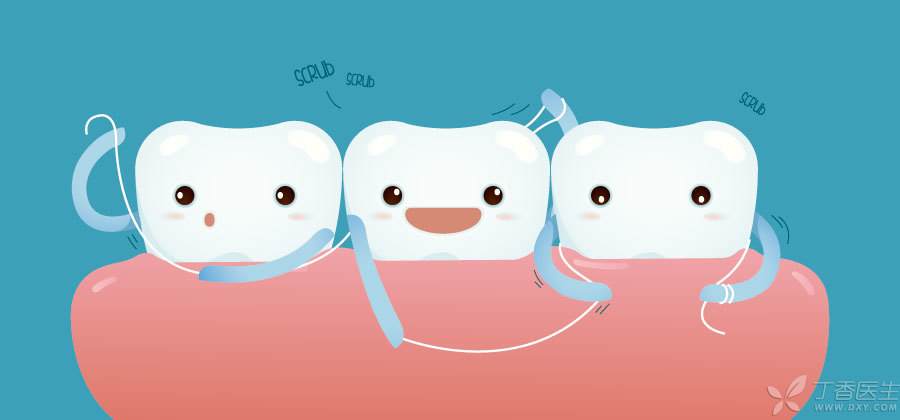
This week, The U.S. Department of Health and Human Services removed the recommendation for flossing and instead recommended an interdental brush.
I have just learned to floss. Do you want to use it now?
Let’s listen to what Dr. Pei Honggang said.
The story of me and floss
I am a person who is troubled by dental diseases. Several teeth have had problems and have been treated. However, the treated teeth always feel that they are not as good as the original ones and are always stuffed.
I used to use toothpicks, Now floss, It feels much better than toothpicks. Floss is pressed into the teeth, When what came out, the impaction of his teeth disappeared immediately. This kind of comfort made me fall in love with floss soon. Now it is almost necessary to use it after meals. If you forget to floss when you go out, you don’t dare to eat it. Now I think back to the days when I didn’t floss before, I don’t know how to get here.
Because my experience is very good, and dentists are also repeating the benefits of popular science floss for teeth. In order not to let children repeat their mistakes, I started floss for my daughter very early in addition to helping her brush her teeth. Now she is over 6 years old and can already use it more skillfully.
However, sometimes she is lazy and does not use floss to brush her teeth. Sometimes I don’t insist because she is very resistant. However, because dentists have repeatedly stressed the importance of floss, I am still vaguely worried: Will she have tooth problems because she doesn’t use floss this time?
Floss is not recommended?
However, the U.S. Department of Health recently deleted the recommendation of flossing. They believe that the current evidence on the effect of flossing to remove dental plaque and reduce gingivitis is weak and unreliable.
Used to be taught by dentists that floss is good for teeth, It can reduce 60% of adjacent dental caries, 70% of periodontal disease, and it can allow you to still have one mouthful of your own healthy teeth at the age of 80. However, in fact, reviewing the studies comparing the effects of brushing and (brushing + flossing) in the past 10 years, it is found that the evidence for the effectiveness of flossing is [weak and unreliable].
This fact is too different from the [common sense] that I formed under the popular science of dentists before, and I feel completely overturned.
However, after careful reading, the advice of the U.S. Department of Health does not mean not to worry about the teeth, but rather to use interdental brushes than floss.
Some people may say that dental floss costs less and is more convenient to use than interdental brushes. The toothpick is less expensive and more convenient to use than dental floss. According to this logic, toothpicks should be recommended.

I will continue to floss
Will I give up flossing because of the new advice of the US Department of Health?
No. Floss has become an indispensable part of my life. I insist on using it because it can help me eliminate the discomfort caused by food stuffing.
I have also noticed that the American Dental Association still recommends floss, and dentists continue to recommend floss.
However, this time the information from the U.S. Department of Health has changed my inherent understanding of dental floss. At least I will no longer feel worried and anxious because my daughter brushed her teeth and occasionally did not floss.
What suits you is the best.
What do you think of whether to floss?
- For something that has no evidence to prove useful, we acquiesce that it is useless, so we do not recommend it. For something that has weak evidence to prove useful, if professional organizations think that its risks and costs are very small, the benefits are greater than the costs (risks), and the benefits/costs ratio is the largest among all schemes, there is no problem in recommending it. However, things that do not have strong evidence to prove useful will be strongly recommended, which is no different from those selling health care products.
For example, as far as my own experience is concerned, I think the symptoms of gingival swelling and pain after flossing are also obviously relieved. Patient experience, expert opinions, and comparative tests of small samples are all evidence, but these are all low-level and weak evidence. The level of our recommendation should be matched with the strength of the evidence, and how much evidence does it have?
Evidence is an important basis for our decision-making, but it is not the only basis.
Drinking is not conducive to health, but it does not mean that all people should be forced not to drink. After weighing the oral desire and health risks, it is not impossible to take a little health risk for the oral desire. It is good to have negative consequences for one’s own choice.
Personally, I can floss very skillfully, And I already like the fun of flossing after dinner, The effect of cleaning food and stuffing teeth is too good, I dare not eat without it. I also have no shortage of money to buy dental floss, so I will continue to use dental floss even if it has minor hazards, what’s more, these minor hazards are accidental, so I will definitely continue to use it, I will insist on my daughter to use it, but maybe I will try the interdental brush, maybe I will change it.
